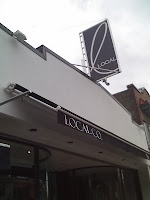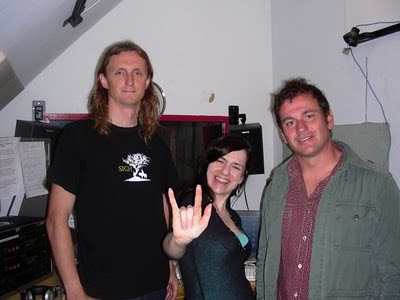I feel like a kind of “us versus them” war is happening in Toronto right now -between people who lives in different regions, who engage in different social activities, who are interested in different things. Can’t we all just get along?
Look! Hear! is a monthly cultural event that happens in the city; its last one, November 30th, was held in the historic Distillery District. The next one happens tomorrow night, in the very-same, neato spot. In the words of the people organizing Look! Hear!, it aims to promote “some of the most exciting and up and coming artists and musicians Toronto has to offer, in the unique and raw space that is the Stirling Room Catacombs.” It closes with a live art auction at midnight.
Art? Catacombs? Auction? Cool! Or at least I think so; unfortunately I wasn’t able to attend November 30th but I definitely plan on following this group. I learned about it through artist Chris Pemberton, whom I interviewed as one of the co-founders of the immensely popular Art Battle. Chris is a great artist in his own right, as the photos here attest; they’re from his super summer exhibition at the Gladstone Hotel.
Now, there are a lot of people in the city who are taking the “us vs them” approach, specifically within the political sphere as a direct result of November’s mayoral race. Chris feels like one of those people who’s trying to break that barrier; would one group of people make it to the Gladstone Hotel, or Look! Hear! if they knew about it? Does that make the groups of people who do go to such venues and events x or y (or *gasp* z)? Should any of that matter when it comes to art? Questions worth debating at any time, in any place. My exchange with Chris demonstrates the heart of connection that lies within the kind of art I like best.
How does your work fit in with the other arts happening at Look! Hear! ?
Look Hear is a special event. Elements such as visual and sound arts are combined to bring an awareness to the space for the evening. I’ve done my best to offer paintings that represent my vision and passion, and let the curator design the rest. Should it fit? Most of the time, yes. Sometimes, if done with care, disjunction is beautiful too.
What does this kind of one-night event give you, as a working artist, in both the short and long-terms?
In the short term it gives the opportunity to share my ideas with a focused community. A special event like Look! Hear! brings people together to be a part of one night, and the enthusiasm becomes a tangible part of experience and the experience of my art. In the long term, it’s an opportunity to connect with the ideas of other people, and to inform my future work or creative process, which is my living process also.
Why do you think it’s a vital event for local artists in the city?
Every artistic element at Look! Hear! is being offered as a best effort in a beautiful venue, produced by a great team. It’s the type of event that supports and creates as it becomes real. I’ve worked with (producer/curator) Morgan Booth on other projects; she has a knack for success and is delightful to work with. I believe Morgan got the artists she wanted, Sarah Eagen and Andrew Dunn Clarke have really impressed me, it’s exciting to show work together.
How does it work with your role as a co-founder of Art Battle?
I’ve really felt a sense of community involvement since we started Art Battle. We’ve met so many passionate and innovative people, it’s inspiring me to maintain my own voice. There’s a lot of work in between shows, whether that’s an Art Battle or an exhibit, it’s important to maintain confidence and creativity. Working and communicating with people who share the same efforts and excitement is how it works. It’s a great fit.
Your exhibit at the Gladstone had a lot of blues and oranges, & was very textural -how long did it take you to find your ‘voice’ artistically? How much is that an ongoing process?
It’s definitely an ongoing process, but if you are true to yourself and what you want to express, the work will always be true, although the voice changes tone over time. My paintings are the paintings that I want to live with -that is my guide.
How do you think events like Look! Hear! & Art Battle foster the culture of a city?
The culture of Toronto will be as rich as we make it. Events like Look Hear and Art Battle bring attention, experience and inspiration to the arts community and beyond. I believe culture is in constant motion, some things take longer to change, some times things shift quickly. The arts often tells us where we have been, sometimes tells us where we are, and occasionally where we are going. I hope that excitement and the connection of good people is where we are going. That’s the culture I want to be a part of.





